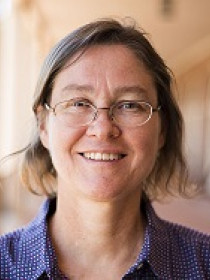
Rebekah L. Herrick
Professor of Political Science, Oklahoma State University-Main Campus
Chapter Member: Oklahoma SSN
Areas of Expertise:
Connect with Rebekah
About Rebekah
Rebekah Herrick got her PhD from the University of Nebraska in 1991. That same year she was employed by OSU, where she has been ever since. Her main research interests focus on issues of representation broadly defined. More specifically, in recent years her research has focused on issue of violence against women politicians, how elections effect turnout, particularly among underrepresented groups, and the political behaviors of indigenous Americans.
Contributions
How Public Servants Experience Violence and Abuse While in Office
Key Findings Brief,
The Political Attitudes and Engagement of American Indians
Key Findings Brief,
Why Beards and Mustaches are Rare for Modern American Politicians
Key Findings Brief,
In the News
Rebekah L. Herrick quoted by Alex Lockie, "Trump Has to Get over John Bolton's Mustache if He Wants Him as His Next National Security Adviser" Business Insider, March 16, 2018.
Rebekah L. Herrick quoted by Jessica Mendoza, "In 2017, Transgender Community Sees Record Political Gains — and Violent Hostility" The Christian Science Monitor, November 16, 2017.
Rebekah L. Herrick's research on politicians with facial hair discussed by , "John Bolton and the Tricky Politics of the Mustache," Politico, January 3, 2017.
Rebekah L. Herrick's research on the rarity of politicians having facial hair discussed by , "Beards, Why?," The Atlantic, December 30, 2015.
"What’s a Politician’s Best Tool? A Razor," Rebekah L. Herrick (with ), The Conversation, September 17, 2015.
Rebekah L. Herrick quoted on stereotypes associated with men’s facial hair by Lisa Wade, "The Politics of Facial Hair" Pacific Standard, June 5, 2015.
Rebekah L. Herrick's research on legislators’ listening to constituents and marriage equality discussed by , "State Legislator Listening Benefits LGBT Issues, Study Says," Huffington Post, March 7, 2013.
Rebekah L. Herrick's research on ethical lapses discussed by , "Who’s Likely to Stray?," CQ Weekly, January 16, 2006.
Publications
"Listening and Representation" State Politics and Policy Quarterly 13, no. 1 (2013): 88-106.
Offers a new way to think about how representatives might work on their constituent’s interests: simply listen to them. Listening involves monitor constituents to understand their interests and then use that information to make decisions. Further it suggests legislators who listen to their constituents are more likely to work on legislation that supports constituents’ preferences on gay and lesbian issues.
"Legislators’ Positions on Gay and Lesbian Rights: The Personal and Political" Journal of Homosexuality 57, no. 7 (2010): 928-943.
Finds that state legislators are less supportive of gay and lesbian rights than the general public. What appears to affect their position are their personal beliefs as well as political calculations.
"Negative Effects of Populism on Gay and Lesbian Rights" (with ). Social Science Quarterly 90, no. 1 (2009): 150-163.
Examines what affects state policies on hate crime and same-sex marriage. It finds that states whose governmental institutions are more open to popular input, e.g. legislators with shorter terms and elected judges, have policies less favorable to gays and lesbians.
"Gays and Lesbians in Local Races: A Study of Electoral Viability" (with ). Journal of Homosexuality 42, no. 1 (2001): 103-126.
Uses an experiment to test whether gays and lesbians are as electable as straight candidates. It finds that gays and lesbians who are out are seen as less electable than those who are just rumored to be gay or who are straight.
"Is There a Gender Gap in the Value of Campaign Resources?" American Politics Quarterly 24, no. 1 (1996): 68-80.
Examines the hypothesis that, although much research finds that men and women candidates are able to raise similar amounts of campaign money, it may be that women need to spend more to do as well as men. This article finds that women running against incumbents get fewer vote per dollar spent and from party strength and women running in open seat races get more votes from party strength.
"Unfastening the Electoral Connection: The Behavior of U.S. Representatives When Reelection is No Longer a Factor" (with ). Journal of Politics 56, no. 1 (1994): 214-227.
Examines the expectation that members having to face reelection will keep close to their constituents by comparing the behavior of members of Congress in their last term with that of other members. It finds that those who are seeking reelection spend more time keeping in contact with their constituents, cast more votes and are more active working on legislation.